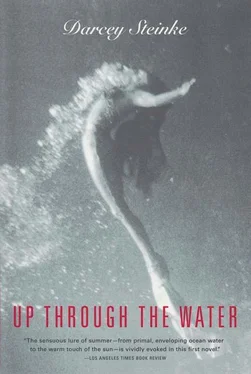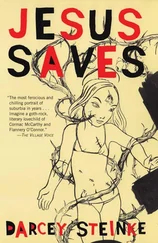Birdflower leaned against the side of the boat. “I saw you yesterday on the beach road,” he said.
“Yeah, I've been around.”
Birdflower kicked one sneaker against the toe of the other. “That's what I've heard.”
Emily was surprised that he would say that. “Why can't I do what I want?” she said.
Birdflower looked out over the water. “Women like you will always have trouble in this world,” he said.
David suddenly gave a banshee cry and did a cannonball off the side of the boat. Michael dove straight and Emily saw him glide for a moment underwater. When he rose, he asked if they were coming in.
Birdflower looked at Emily. “Go ahead,” she said. “I'll watch.”
He dropped himself over backwards like a scuba diver. Emily stood and put a knee over the edge as if she was riding sidesaddle.
David swam around the hull, checking for chipped paint or soft spots in the wood. Birdflower kept his feet up and paddled his hands. The men in the water looked similar as otters and their wet hair and shoulders gleamed. She imagined huge schools of fish extending beneath them. She imagined the prickle of scales as the fish undulated. Sometimes she would find herself thinking of fish and feel a muscle, a swim come over her. Emily loved whales because of the way they moved, quietly as clouds. She still remembered how she and Eddie had played in the inlet. Underneath they swam together and apart as whales do, circling, somersaulting; they seemed much bigger than themselves in the dark water. She was also fascinated with the goosefish. She'd talked one morning to a shaken-looking man from Manteo. He had been fishing on the point and claimed to have seen a goosefish, tiny teeth like ivory nails, damp down and pull a low-flying piper under the surface. Lately she'd been watching the scrawled filefish that lolled in Pamlico Sound. They were gluey white, with the small eyes of a scholar, and each had a different pattern of shapes, like some exotic language, etched over its skin.
Emily left the boat's edge, leaned back in her chair and closed her eyes. She always felt as if she were swimming in a maze of fish, patterns over her body of light and water.
Later in the afternoon, Emily watched Birdflower on deck. A few hairs blew out of his braid and floated free from his head. Neither of them had even had a nibble all day, but earlier, at noon, David had caught a small dolphin that had flapped on deck — its blue skin stretched thin like a balloon. The small eyes and tender pale belly reminded Emily of a baby and she'd convinced them to throw him back.
The beer made her head light. She saw Birdflower watching the bones in her neck and shoulders. She felt tugs from her line now and then, but no real tension.
“Look,” David said.
Emily flipped her head to the dolphin threading in and out of water.
Birdflower jerked back. “I got something.” He pushed his feet into the floor, clamping down on the pole, and pulled his weight back.
The fish, a thin muscle, flipped out of the sea. “It's a sword,” Michael said.
The pole jerked toward the water. Birdflower leaned back. Emily watched his knuckles whiten. She stood and moved her hand to his shoulder. As she was trying to follow the fin, she saw the image of John Berry over the water. She knew he was there to let her know he thought Birdflower was an insubstantial kind of man and that it was weak for her to start up with him. His face was stern like the pirates from whom he'd descended. Emily would forget the islanders were kin to Blackbeard, but then on Friday nights they'd come out to Paolo's, and when a fast song clicked and fell in the jukebox, they'd do a crazy shuffle step — jeans rolled to their knees, smelling like fish and sun — they swung their long-haired girlfriends.
The fish buckled above water. Her hair blew back hard, and she had to bring her head forward to steady herself. If he'd been able to, she knew John Berry would have accused her of letting him think nothing was wrong, of making him look like a lovesick fool. She wanted to tell him that in her own way she had felt for him. There were things, triggers, his boyish hand movements, curls like the fine fur of pheasants on the back of his neck, and sometimes with him there had been an abandon.
The sword's top fin skimmed the water. “Talk to me,” Birdflower said.
Emily felt hungry and a little dizzy, and again when she looked out over the water, she saw John Berry and her hands tightened on Birdflower's shoulders. It seemed to her it was him, snagged and straining on the end of the line. “Think of it like a man,” she said into his ear.
Michael gave her a puzzled look. “What are you doing?”
“Let her go,” Birdflower said.
The swordfish was twenty yards away, the line tight as a guitar string. Emily watched it buck at the surface. “He's calling you names,” Emily whispered.
Birdflower grimaced and held on. She tightened her grip on his arm and felt tension through his skin. There was a sudden tug. Birdflower lost his grip and the line reeled out.
“A breakaway,” David said. “Pull back.”
Birdflower did, but the line slackened and blew.
Everyone was quiet and the water too seemed calm. The sudden stillness felt eerie to Emily and she walked over to the edge to look for a flicker or a slash of fin. If he caught the fish, she knew they'd string it up and take pictures, like those at the restaurant behind the cash register, photos of grinning men with beers held high to the camera. There were hundreds of these, some overlapping so only the fish showed, the pictures forming a school of minnows swimming off the restaurant wall.
The line went taut again and Birdflower pulled his body back, then caught the slack and wound in. This went on till Emily heard the fish bump the side of the boat. The net clapped water, and as they raised it, Emily saw the fish wrapped in rope. On deck, it hissed and flipped. Birdflower beamed over the sword. She reached to the back fin, chrome-green and familiar, ridges fanning out like a wet feather.
The swordfish steaks cooked in the black skillet, turning from a transparent pink marble to firm white. They swam in butter, mushrooms, and scallion bits. “Cajun style,” Birdflower said, standing over the stove. He took a sip from his wine, then set it down. “It's exciting. Life on the end of your line.”
“My heart went thump, thump, thump,” Emily said.
She watched from her chair at a yellow table in his one-room cottage, an unmade bed in the far corner. On the wall, photos of suns over water. And leaning against the far wall, his guitar, a ukulele, and a big Western twelve-string.
“How old's your boy?” Birdflower asked, the fish crackling behind him.
“Sixteen.”
Birdflower shook his head. “You with a kid that old?”
“I don't see what's so strange about it. Some women have babies at twelve,” Emily said.
“White trash women.” Birdflower grinned.
“It's more than some have to show for themselves,” Emily said.
“I just don't think of you as a mother.”
She pointed to the photos. “Which ones are which?”
“The blood-orange suns, the ones like coals, are the sunsets. The other ones are mornings.”
Emily stared at the dawn suns, which were grayer and seemed to have a kind of music in them; flute, guitar.
He set down seashore-pattern plates bordered with tiny umbrellas and beach balls. “Former tenants,” he said.
Emily gazed to the bongs, rolling papers, and pipes scattered among his things. “You smoke a lot, don't you?”
“Yeah,” he said. “But not like you might think.”
She watched him lever up the fish and peek underneath.
For months bodies had blurred in her mind. Lips, puffs of underarm hair, the swell and curve of a fleshy calf. John Berry had become familiar, like a brother it seemed; he held her in the nights. But the thought of him fell away each time she strayed. He became a blind spot with the whoosh of her clothes landing on the floor. With strangers there were ten minutes of unornamented reality. A kind of mainline black rush of being alive in the most obvious, necessary way. Her whole life was lived for these: cheek to the hollow space between back and shoulder, arm resting in arm, legs wrinkled together.
Читать дальше












